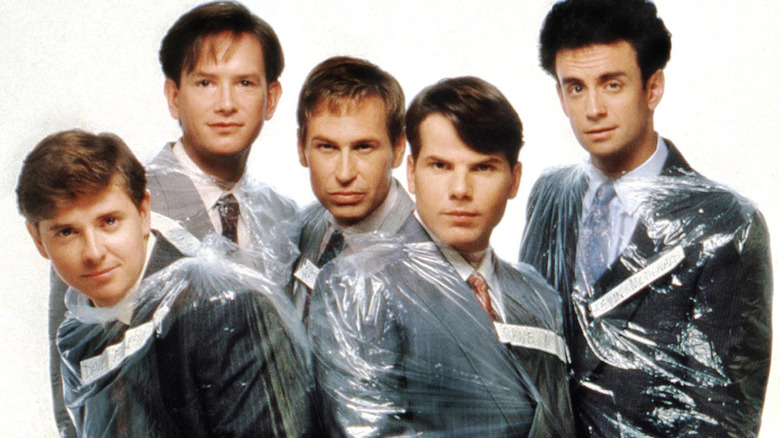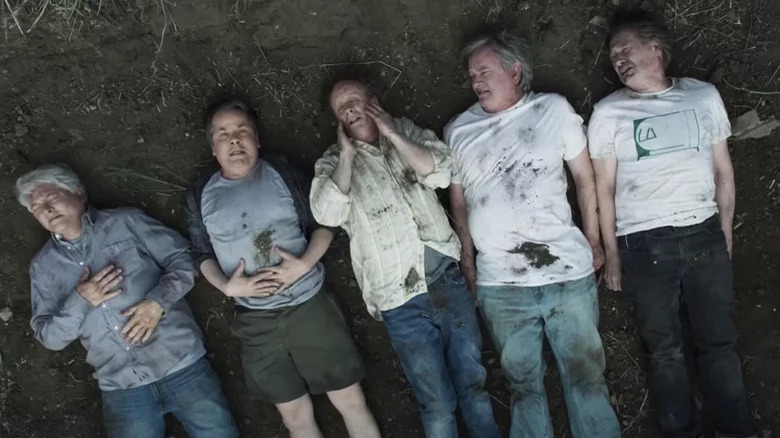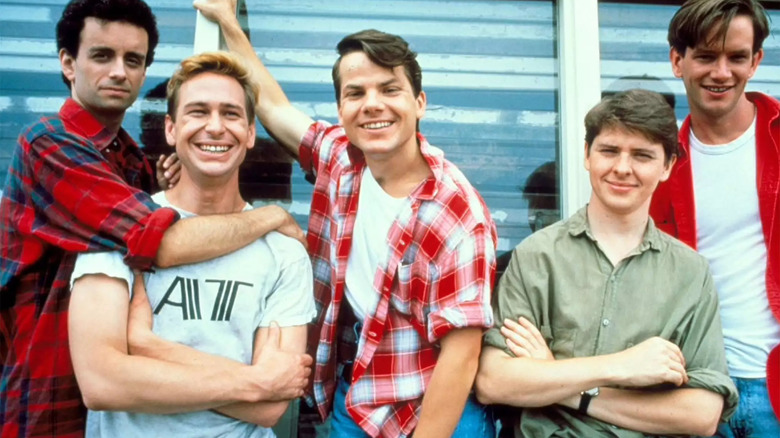
The "Kids in the Hall" sketch comedy show didn't debut on Canadian television until October of 1988, but the Kids themselves — Dave Foley, Bruce McCulloch, Mike McKinney, Kevin McDonald, and Scott Thompson — first met and formed in Toronto in 1984. The story goes, according to the Canadian Encyclopedia, that McCulloch and McKinney, working with their troupe The Audience, met and fused with Foley and McDonalds, who were already calling themselves Kids in the Hall. Thompson joined in 1985, and the quintet worked the Toronto stand-up scene performing sketches live on stage for about a year. The Kids split up in 1986 to pursue other projects, with Thompson and McDonalds getting in with the Second City comedy troupe and McKinney and McCulloch being invited to write for "Saturday Night Live." Despite these dalliances, they would reunite again, also in 1986.
"SNL" producer Lorne Michaels had once seen the troupe perform together, and he gathered them to produce a proper, absurdist sketch comedy show. "Kids in the Hall" was an enormous success, debuting on CBC and also HBO, and eventually lasting until 1995. The group made their own movie in 1996 ("Kids in the Hall: Brain Candy" was a send-up of the pharmaceutical industry and the commercial takeover of antidepressants), and reunited from time to time for one-off specials or live performances. They had their first special "Same Guys, New Dresses" in 2000, they performed at the 2007 "Just for Laughs" festival, etc. In 2022, they were the subject of a documentary film called "Comedy Punks," wherein the five members reminisce on their origins and why they took hold in pop culture the way they did.
"Comedy Punks" is, of course, a perfect descriptor for the Kids in the Hall. While they were overseen by Michaels, their show was far stranger, more sardonic, and aggressively more surreal than anything one might see on "SNL." Indeed, as described in an interview in Deadline, the Kids were incredibly daring and progressive when it came to depictions of gender and sexuality.
Not A Lampoon

The Kids would employ shock humor, of course — notoriously, they wrote a few comedy segments about the plight of an ailing child, and the troupe has expressed regret over their poor taste in creating him — but also would responsibly wield sexuality and gender in ways not usually seen in the comedy world. Thompson, openly gay, would play queer characters whose sexuality was incidental rather than an angle for derision (homophobic and "gay panic" humor were all too common in 1980s comedy), and when the all cisgender-male troupe would dress in drag, they actually played female characters in an actorly fashion.
In the Deadline interview, McKinney recalls employing some method-like techniques when dressing in drag:
"The Kids, to the extent that a man can inhabit a woman, did an amazing job of sort of creating these relatable characters. I know my brother based at least a couple of those characters a little bit on my mother, a little bit on my sister, imported that into himself ... Up until then, if I remember what drag looked like on TV, it was a lampoon, it was way larger than life."
Punks

This was 1984 — yes, people noticed it was a year referred to by George Orwell — and it was a time of rising dissatisfaction with rising conservatism. On the outer fringes, punk rock was beginning to rise as an ethos. A lot of underground music was devoted to destruction, angst, dissatisfaction, and the violent confrontation of "traditional" (read: repressive) institutions. Kids in the Hall, in a dorky sort of way, adopted a similar punk attitude. They weren't so much the Sex Pistols, though, as they were Devo: Geeky, appealing to the college crowd, playful nihilistic, and eager to shock.
In a world of homophobic gay shtick and burlesque-style drag performances, having an openly gay member of the troupe was revolutionary. Thompson's character of Buddy Cole, a queer raconteur, regularly appeared on "Kids in the Hall" to perform comedic monologues, which were, refreshingly, never made to mock or deride the queer experience. The heterosexual members of the troupe fell in line behind Thompson and merely played alongside him. They all assimilated with one another. Recalls producer Paul Myers:
"In Toronto, when I was at the Rivoli Club where they started, there'd be a small audience and you would hear gasps when [Scott] came out as a queer positive character. [Thompson] assimilated within the troupe. There was no sense of, 'He was the only [one] doing this gay thing over here.' They were allies and they were all just working together. That, just by being there, was political, and there were audience members I recall in Toronto who were shocked back in the day. This is the '80s, you know, so it's amazing to think in some ways how far we've come."
Thompson, in interviews, has said that Buddy was a vital character in helping to keep the Kids in the pop consciousness, and it allowed a lot of otherwise unaccepting audiences to accept him. From The AV Club in 2018:
"The world is so different than it was 20 years ago, particularly for gay people. Just being an openly gay comic, 20 years ago, people were so uncomfortable, and you had to spend the first 20 minutes relaxing them. Now you don't have to. People are there right away. And the straight male can laugh at me and not cast too much of an aspersion on his sexuality. I really believe that part of the reason Kids In The Hall remain such a cult thing is that, to like us too much was to say, 'Hey are you a f**?' I don't think people worry about that anymore. At least in the circles I run in, and that's extremely exciting."
The latest "Kids in the Hall" revival will premiere on Prime Video on May 13, 2022. The documentary "Comedy Punks" will follow on May 20.
Read this next: 20 Underrated Comedy Movies You Need To Watch
The post Kids In the Hall Were Already Ahead of Their Time When They Started In the '80s appeared first on /Film.
from /Film https://ift.tt/Rkn4KPf







0 Comments
Please don't use vulgar comments and avoid discussion on Religious matters